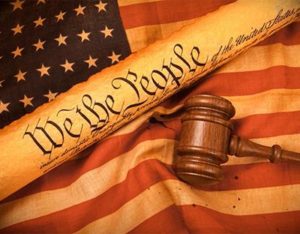It’s been three days since Robert S. Mueller III issued his extraordinary statement about why he reached certain conclusions about Donald Trump’s alleged collusion and obstruction of justice.
I want to focus briefly on a particular point that the former special counsel made in his nine-minute recitation before the nation.
It’s the part where he said that he and his legal team looking into the Russian attack on our electoral process in 2016 could not indict the president because of a Department of Justice policy that prohibits indicting a sitting president.
Then he said such an indictment would violate the U.S. Constitution.
I believe my eyebrows raised just a bit the moment I heard Mueller make that assertion.
I have a copy of the nation’s governing document on my desk. I have been poring over it. I have looked through Article I, which lays out congressional authority and through Article II, which spells out presidential authority. I have looked through all the other original articles in the Constitution, all the way to Article VII.
I cannot find a single reference that protects the president of the United States from indictment. I cannot locate anything at all that speaks even tangentially about the issue.
I am not going to quibble and quarrel with Robert Mueller, a fine lawyer and a former FBI director. He’s a great man with impeccable integrity. I honor the work he did while compiling his report to the nation and I certainly honor his decades of public service.
Moreover, I understand how DOJ policy could prohibit an indictment. However, a policy is much less binding than anything codified in the U.S. Constitution. Policies can be rescinded. Agencies that enact policies can change them. The Constitution is a different sort of creature. To amend anything, you need a bill to come out of Congress and you then need a super-majority of states to ratify the law.
So I am asking: Can anyone find a constitutional reference that declares that presidents cannot be indicted?

There is no” Constitutional” policy as you state, but there is a policy in place
The U.S. Justice Department has a decades-old policy that a sitting president cannot be indicted, indicating that criminal charges against Trump would be unlikely, according to legal experts.
In 1973, in the midst of the Watergate scandal engulfing President Richard Nixon, the Justice Department’s Office of Legal Counsel adopted in an internal memo the position that a sitting president cannot be indicted. Nixon resigned in 1974, with the House of Representatives moving toward impeaching him.
“The spectacle of an indicted president still trying to serve as Chief Executive boggles the imagination,” the memo stated.
The department reaffirmed the policy in a 2000 memo, saying court decisions in the intervening years had not changed its conclusion that a sitting president is “constitutionally immune” from indictment and criminal prosecution. It concluded that criminal charges against a president would “violate the constitutional separation of powers” delineating the authority of the executive, legislative and judicial branches of the U.S. government.
“The indictment or criminal prosecution of a sitting President would unconstitutionally undermine the capacity of the executive branch to perform its constitutionally assigned functions,” the memo stated.
The 1973 and 2000 memos are binding on Justice Department employees, including Mueller, according to many legal experts. Mueller was appointed in May 2017 by the department’s No. 2 official Rod Rosenstein.
But many of the opposition and the majority of the press overlook the obvious.
Note, that the memo that governs Mueller refers to a “sitting President”
There is a Constitutional provision for the removal of a President. Congress can first requires impeachment by the House of Representatives. Since the House is controlled by Democrats, Impeachment most could occur.
Once Impeached, a President can be tried by the Senate and removed from office. The Senate is controlled by Republicans, so removal from office is probably unlikely.
Should the President be removed from office, the immunity dissipates. The Ex-President could be indicted and prosecuted. There is still “The Burden of Proof”
This is the problem with our current Congressional System. No one represents the People, no one represents the Constitution and no one represents the law. They only represent their Party.
Politics is the Fine Art of Compromise. No one in Congress understands the word “Compromise”
This is additionally fed by the media with their own agenda. Ideally the media should present the facts on both sides of the issue and let the reader decide. Unfortunately, the media, like Congress doesn’t think the public is smart enough to make their own decisions………. not that I sometimes agree with that assessment.
The media also is guilty of withholding facts, especially when those facts don’t support the editorial position.
Facts are Facts, and no one can have an opinion about Facts, until the Politicians and the media begin telling you what your opinion should be.
Some of these problems could be eliminated or at least controlled by the simple establishment of term limits. We need a turnover of Congress to keep ideas fresh and to allow the public to determine their destiny.
Currently the members of the Senate, the House and for some strange reason, the Vice-President have unlimited terms.
A representative has a two year term. Let’s restrict that limit to three terms. After 6 years we can get a new representative.
A Senator has a six year term. Limit that to two terms.
Let’s return to a system that is represented by the people and do away with a system of Oligarchy.